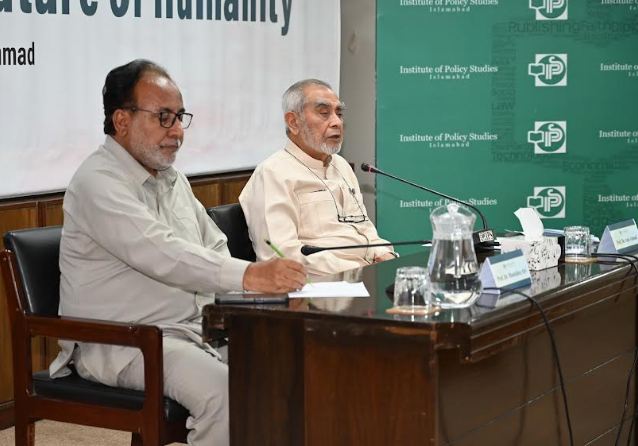ISLAMABAD, SEPT 2 /DNA/ – There is a need to rethink how history and civilization are understood, as Eurocentric frameworks sideline ethics and divine guidance, reducing progress to fragmented and materialistic notions. In sharp contrast, the Qur’anic perspective views history as a moral process shaped by universal values such as justice, fairness, and social responsibility, and sees civilization as the embodiment of these values in cultural, social, and institutional life.
This was discussed during a thought-provoking lecture titled “Understanding History and Civilization the Right Way” held at the Institute of Policy Studies (IPS), Islamabad, as part of its ongoing series “The World Today and the Future of Humanity.” The keynote speaker was Prof Dr Anis Ahmad, vice chancellor of Riphah International University and a leading social scientist renowned for his scholarship in the fields of education, religion, and social sciences. The hybrid session drew a large audience of educationists, scholars, and students from various countries, underscoring the global relevance of the themes under discussion.
Opening the session, Dr Mustafeez Ahmad Alvi, an academic specializing in Islamic socio-political thought, pointed out that prevailing notions often reflect Eurocentric frameworks, which have shaped contemporary responses to social and political challenges in ways that may not always serve humanity’s long-term interests.
In his lecture, Prof Anis Ahmad traced the evolution of Western historical thought, from the rationalism of the Greeks and the theological interpretations of medieval Christianity, to the scientific materialism of the Renaissance and Enlightenment, and finally to the relativism of postmodernism. He noted that each stage progressively reduced the role of ethics and divine guidance in explaining human development. This, he argued, led to a fragmented understanding of human civilization, one that compartmentalized human life into secular and sacred domains and often defined progress in purely material terms.
By contrast, Prof Ahmad highlighted the Qur’anic perspective, which views history as an ethical process rather than merely a chronological or material one. He said Islamic thought conceives history as a dynamic interaction between past and present, providing lessons for building a just and balanced future. “The rise and fall of nations,” he observed, “is determined not by military power or economic might alone, but by their adherence to universal ethical principles such as justice, fairness, honesty, and social responsibility.”
He emphasized that culture and civilization are inextricably linked to values. Culture, he explained, represents the ethical and moral foundations of human life, while civilization is the manifestation of these values in tangible forms such as institutions, economies, and social systems. In this framework, Islamic civilization is not a legacy of a particular region or people but a value-based system with universal applicability. “Principles such as tawhid (unity of God), adl (justice), and akhlaq (moral conduct) are not Muslim-specific,” he stated. “They are universal values that, if upheld by any society, can ensure sustainable progress and human dignity.”
The lecture also addressed contemporary challenges, including the crisis of education, the dangers of historical distortion, and the ethical vacuum in politics and economics. Prof Ahmad underscored the need for Muslims to move beyond ritualistic or literalist understandings of religion and to reclaim Islam’s comprehensive approach, which integrates faith with reason, morality, and social responsibility.
Responding to a query on whether the Islamic perspective on history was “theological” rather than “scientific,” Prof Ahmad clarified that the Qur’anic approach is neither mythological nor dogmatic. Instead, it is rooted in ethics and observable principles of human behavior, making it both rational and verifiable. “Islamic history,” he remarked, “is not the history of miracles or myths, but of human choices, responsibilities, and consequences.”

















